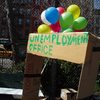Louise Story appears in the following:
WikiLeaks' Next Target: Financial Crimes
Tuesday, January 18, 2011
Rudolf Elmer, an ex-employee of the Swiss Bank, Julius Baer, handed over two discs to Julian Assange and WikiLeaks, in a press conference yesterday. The discs reportedly contain information on tax evasion and other crimes of more than 2,000 individuals and companies around the world. Louise Story, Wall Street and finance reporter for The New York Times, sees these events as a preview of what could come shortly, as rumors swirl that WikiLeaks will release damning information on a major American bank; perhaps Bank of America. Is the website's new target corruption in the financial industry?
New Businesses Do More to Fix Economy Than Small Businesses
Thursday, January 13, 2011
When it comes to job creation, young businesses hire more workers than small businesses, says a new report out from Bank of America. The report contradicts the common political mantra that we need to get small businesses hiring in order to fix the economy. Labor data shows that startup companies are, in fact, the ones that drive hiring, creating 20 percent of all new jobs. However, now is a bad time for these small companies. This is partially due to the housing market, as new business owners take out home equity to support their new enterprise.
Wall Street Bets on Economic Growth
Tuesday, January 11, 2011
On Wall Street, banks have wagered big bets that the economy will improve. The 18 banks that trade with the Federal Reserve have reported that holdings of U.S. government debt, in treasuries, has fallen at the fastest pace since 2004. Holdings of treasuries fell from $81.3 billion on November 24th to just $2.34 billion on December 29th. This dramatic drop indicates that the economy may be looking up, but it also makes the banks' balance sheet look better since they hold less debt.
SEC Investigates Country's Largest Public Pension Fund
Friday, January 07, 2011
Louise Story, Wall Street and finance reporter for The New York Times, discusses her breaking story on a new investigation by the Securities and Exchange Comission against the California Public Employees' Retirement System, known as Calpers. During the financial crisis, the fund lost a significant portion of its portfolio, leaving the California on shaky financial ground.
Global Food Prices on the Rise
Thursday, January 06, 2011
New data out by the United Nations shows that world food prices rose by 32 percent in the second half of 2010. Food prices for staples haven’t been this high in two years. The last time they reached these levels, food shortages sparked riots in poor nations. Is another food crisis on the horizon for struggling nations? And what does this mean for Americans?
Bank of America Settles with Freddie and Fannie Over Mortgage Dispute
Tuesday, January 04, 2011
Bank of America announced a $2.8 billion settlement with Freddie Mac and Fannie Mae on Monday. The American-owned firms demanded that Bank of America buy back mortgages whose quality was misrepresented by Countrywide, which is owned by Bank of America. Louise Story, Wall Street and finance reporter for The New York Times analyzes the implications of the settlement.
War Bonds, Congress' Declaration of War, Americans on the War
Friday, December 24, 2010
- Business Takeout: To finance the war effort, Secretary of Defense Henry Morgenthau brought in a new public investment that appealed to American patriotism. They're called "War Bonds," and everyone is being asked to invest. Takeaway contributor Louise Story tells us how it works and how Americans take part.
- Washington Takeout: After the Pearl Harbor attacks, Congress needed no debate to pass a declaration of war at Roosevelt's urging. But what actually happens when a state of war is declared? Takeaway Washington contributor Todd Zwillich investigates.
- Reaction Takeout: We hear more reaction from ordinary people on the country going to war. Not everyone was in favor.
Cities, Municipal Bonds and a Potential for Disaster
Thursday, December 23, 2010
There's hope that the U.S. can pull out of this economic slump it's in, but there's a potential disaster looming for states that could derail any economic recovery. Meredith Whitney, a financial analyst famed for predicting Citigroup's major debt fallout, made a new dire prediction. She believes up to 100 U.S. cities could default on their municipal bonds.
Rating vs. Resume: Can Bad Credit Kill Your Job Prospects?
Thursday, December 23, 2010
We reported yesterday on a lawsuit brought against test-prep giant Kaplan by the Equal Employment Opportunity Commission, who accused the company of discriminating against African-American job applicants by using credit histories in their hiring processes. As it turns out, Kaplan is hardly the only company to do so. According to Takeaway listener Christina Tobin, her bankruptcy filing report has overshadowed her new accounting degree in her job hunt.
Kaplan Accused of Discriminatory Hiring Practices with Credit Checks
Wednesday, December 22, 2010
Lenders typically ask to access someone's credit scores in order to see what kind of loans they have paid back in the past. Agreeing to a credit check has become an expected part of preparing to lease a car, buy a house or rent an apartment. But did you know a potential employer may also check your credit score before you get hired?
November Home Foreclosures: Behind the Numbers
Thursday, December 16, 2010
Over the past two years, we’ve been told to expect a silver lining to the housing crisis. At a first glance, the release of tomorrow’s foreclosure numbers should add to that optimism, as analysts expect the number of new foreclosures to drop dramatically. But does that mean we’ve truly passed the worst moments of the housing crisis?
Long Tradition of Holiday Bonuses Likely To Continue
Tuesday, December 14, 2010
Many sounds, sights and traditions have long been hallmarks of December…from decorating a Christmas tree to the singing of carols. And at least one seasonal tradition is specific to the workplace: the holiday bonus. But where did this tradition come from? And in our current economy, will it disappear?
Financial Derivatives: Lucrative, Barely Regulated and Run in Secret
Monday, December 13, 2010
Even as lawmakers implement the fiscal reform passed by Congress, a tiny handful of banks exert the lion's share of control over the lucrative derivatives market — and they do so both secretly and exclusively. As consumers, we pay for derivatives every day when we buy nearly anything, from food to airplane tickets to heat for our homes. A little regulation and transparency could reduce giant fees paid to banks, and put billions of dollars back into the economy. So why does the running of these markets remain so securely hidden?
Proctor & Gamble Look for Rising 'Tide' of Dry Cleaners
Thursday, December 09, 2010
When it comes to brands you find in the laundry aisle, Tide has been reinvented about a million different ways, whether as a more concentrated detergent formula, into a stain remover, or a fabric softener. There is one area of the laundry industry that has historically been very hard to corner nationally, however. Tide's parent company, Proctor and Gamble, now intends to take the brand into...dry cleaning. Can a major company like Tide replace mom-and-pop?
The Fed's New Crackdown on Ponzi Schemes, Big and Small
Tuesday, December 07, 2010
The Justice Department and other federal agenceies are cracking down on would-be Bernie Madoffs of the future. Yesterday, Attorney General Eric Holder tallied the results of a nationwide Financial Fraud Task Force that’s meant to target investment fraud and other Ponzi schemes.
US Banks Nervously Await Next WikiLeak
Friday, December 03, 2010
Back when WikiLeaks wasn’t a household name, editor Julian Assange mentioned to ComputerWorld magazine that he had 5 gigs of information from a Bank of America executive’s hard drive. Then last week, Assange mentioned to Forbes that he has something that may take down “a bank or two,” refusing to specify which ones.
Fed Reveals Billions in Bailout Loans during Financial Crisis
Thursday, December 02, 2010
Most of the companies who received money from the TARP bailout funds have been public knowledge ... but yesterday, the Fed revealed that a slate of prominent American companies used billions of dollars in bailout loans during the height of the financial crisis, including such corporate pillars as GE, Verizon and McDonalds, to name a few. We speak with New York Times Wall Street and finance reporter Louise Story for the program's details.
Prosecutors Wiretap Wall Street
Tuesday, November 30, 2010
Prosecutors with the Security and Exchance Commission say they received information sufficient to subpeona and raid a number of hedge funds last week from conversations recorded over wiretaps. According to a report in The New York Times, investigators enlisted the help of seven Wall Street insiders to tape over 500 people using tidbits of informal information to strike deals on the stock market. Is this "mosaic theory," as the expert network firms call it, or "insider trading"?
Black Friday: Super Shoppers and Shopping Cynics
Friday, November 26, 2010
On Thanksgiving, many of us give thanks. On Black Friday, retailers give thanks. Black Friday is the biggest shopping day of the year; and many stores open before dawn and remain open late into the night to capitalize on the holiday. For the past two years, the economic downturn has hurt Black Friday sales. We're checking in with a few of our listeners to see whether they're super shoppers or shopping cynics.
How to Save Ireland: Bailout, or a Haircut for Lenders?
Tuesday, November 23, 2010
The International Monetary Fund’s $140 billion bailout for Ireland has been set in motion, but some economists are talking about a better option for the Emerald Isle: defaulting on their debt. What’s so bad about asking investors to suffer the consequences of over lending?



















